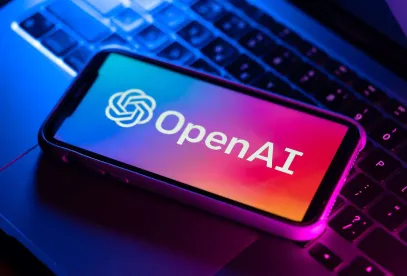In a previous post, we highlighted three key items to look out for when assessing the terms and conditions of generative artificial intelligence (“GAI”) tools: training rights, use restrictions and responsibility for outputs. With respect to responsibility for outputs specifically, we detailed Microsoft’s shift away, through its Copilot Copyright Commitment (discussed in greater detail below), from the blanket disclaimer of all responsibility for GAI tools’ outputs that we initially saw from most GAI providers.
In the latest expansion of intellectual property protection offered by a major GAI provider, OpenAI’s CEO Sam Altman announced to OpenAI “DevDay” conference attendees that “we can defend our customers and pay the costs incurred if you face legal claims around copyright infringement, and this applies both to ChatGPT Enterprise and the API.”
GAI providers offering copyright (and, in some cases, other forms of IP) protection and indemnification is not entirely new. For example, in June of 2022, GitHub agreed to indemnify users of its GAI-powered coding tool Copilot from certain outputted code infringement claims, but only if they used Copilot’s “duplication detection” filter designed to detect “code suggestions matching public code on GitHub” and prevent them from being delivered to the user.
Following GitHub’s lead, this year, several other GAI providers started rolling out intellectual property protection for GAI-generated outputs for paying users of certain of their GAI tools. In June, for example, Adobe began to offer intellectual property indemnification for commercial users of Firefly, its GAI-powered image creator application. The next month, Shutterstock introduced indemnification protection for its enterprise customers covering the license and use of GAI-generated images on its image generator platform. (In all of these cases, the indemnification protection offerings are subject to caveats and other terms and conditions, which may, in some cases, include limits of the GAI provider’s liability.)
Although valuable to users of these tools, these protections had limited meaning in the overall GAI market because (until recently) they have been limited to tools with fairly narrow and specific use cases, like coding and image generation.
On September 7th, as discussed in our previous post, Microsoft announced its Copilot Copyright Commitment, giving assurances to paying customers that they can “use Microsoft’s Copilot services[1] and the output they generate without worrying about copyright claims”. Unlike the previously mentioned protection offered by GitHub (owned by Microsoft), which was narrowly limited to the GitHub Copilot coding tool, the Commitment covers other Microsoft Copilot services, including Microsoft 365 Copilot, which integrates into various Microsoft 365 applications. On September 28, IBM also stated it would indemnify customers against intellectual property claims arising from such customers’ use of the watsonx artificial intelligence and data platform. In October, Google followed suit with an announcement of an indemnification offering covering similar GAI tools.
Now, with OpenAI’s recent announcement of broad “copyright shield” protection for ChatGPT Enterprise and ChatGPT API customers (but not users of the free versions ChatGPT and ChatGPT+), we are seeing a GAI provider offer more expansive protection than we have seen thus far; OpenAI’s Copyright Shield covers the many use cases of these ‘general purpose’ GAI tools—especially the myriad of ways in which the API can be integrated into customers’ front-end and back-end software (subject to applicable limitations set forth as carve-outs from indemnification protection in OpenAI’s terms and conditions).
It remains to be seen whether OpenAI’s Copyright Shield signifies the pinnacle or merely another checkpoint in the trend of expanding intellectual property protection offered by GAI providers, and at time of writing, OpenAI’s terms of use have not yet been fully updated to provide all of the specific legal details of the Copyright Shield. Prospective customers of GAI providers should continue to track market developments and closely review the terms and conditions of GAI tools to assess risk associated with output responsibility.
Jiyoon Kim also contributed to this article.
[1] The Commitment also applies to Bing Chat Enterprise, though it is currently still in preview.



 />i
/>i

